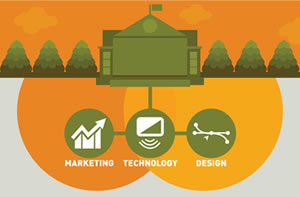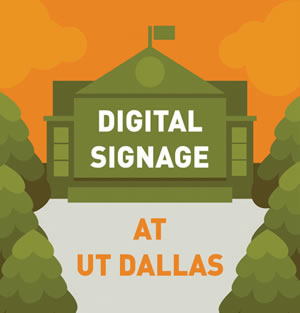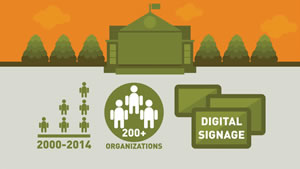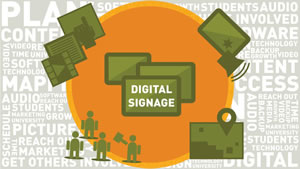Reaching and Engaging Students with Digital Signage

ILLUSTRATIONS COURTESY OF THE UNIVERSITY OF TEXAS AT DALLAS
From digital signage to social media outlets to mobile applications, we are surrounded by constantly updating information that educates, empowers and enlightens us. This experience has effectively changed our communication patterns, allowing marketers to better reach their audience. But even as we are connecting to society and to one another in new ways, digital media has saturated our world with an excess of information. The more digital advertisements an audience is exposed to, the more the audience becomes desensitized, making it exceedingly more challenging to obtain and hold viewer attention.
In the educational realm, advertising to students can be difficult when also competing with social media and entertainment outlets. At The University of Texas at Dallas (UT Dallas), we have made efforts to better understand and engage our student audience, taking advantage of digital resources in order to keep students informed about campus events, news and organizations available to them.

ILLUSTRATIONS COURTESY OF THE UNIVERSITY OF TEXAS AT DALLAS
Keeping Up With Growth
We are an innovative institution that is steadily expanding. Our school’s enrollment more than doubled between 2000 and 2015. This rapid growth makes it all the more important to use effective marketing strategies, including print, web, social media and digital signage. Although a relatively new initiative within the Student Affairs division at UT Dallas, our digital signage program has swiftly expanded into campus lounges, eateries, residence halls and recreational centers in an effort to enrich student lives via the sharing of information. For Student Affairs, incorporating messaging into common areas has been essential in reaching our student body. The areas where our digital signage is situated were thoughtfully selected based on traffic flow and the probability of students remaining at the location for an extended period of time, thereby increasing the chance that advertisements would be viewed. Student Affairs’ digital displays also are purposefully reserved for sharing non-academic events and programs in order to encourage students to participate in activities that will complement their overall experience during their time with the university.
There are more than 300 student organizations at UT Dallas, ranging from student government to rugby to the origami club, all of which draw students to activities that can be mentally, physically and socially beneficial. Digital signage allows an opportunity for student organizations to broaden their reach and better engage their target audiences. However, getting student organizations to utilize the service can be a difficult task. When we prepared to initiate our program for student use, we focused on defining the “who,” “what” and “where” for our student users, in an effort to better clarify expectations, desired outcomes and goals. This step was essential in shaping our program, and helped us set strict guidelines and boundaries to ensure the use of digital signage was successful and mutually beneficial for students and administrators alike.

ILLUSTRATIONS COURTESY OF THE UNIVERSITY OF TEXAS AT DALLAS
Develop a Plan
Having a well-rounded strategy that includes marketing, technology and design is essential in reaching the constantly changing campus community. Messaging, technology and design must work simultaneously to ensure that a consistent, upward pace is maintained with regard to use and views. Our digital signage program is reviewed regularly, and frequently undergoes adjustments in an effort to more effectively reach student groups. With each evolution of our program, we work to ensure the material is new and relevant.
In the early days of our digital signage initiative, we faced issues related to content lulls. Utilizing existing media has not only assisted in growing our digital signage portfolio, but it has also allowed us to make better connections with student organizations. For example, we repurposed video clips from our student television station in order to promote their new web-based entertainment series, as well as their other web-based offerings. This was done by taking short pieces of the entertainment series and including text that directed students to the complete episodes. Since new episodes of the series were released bi-weekly, we consistently had new content to share.

ILLUSTRATIONS COURTESY OF THE UNIVERSITY OF TEXAS AT DALLAS
MAKE THE CONNECTION. UT Dallas is a growing university with more than 300 student organizations. The digital signage program at UT Dallas was initialized to further the reach of student marketing material within the campus community. When considering a digital signage program for your university, take into account factors such as content, location and hardware/software. Making a plan for your program will ensure your success.
Involve Students in Your Program
Incorporating student-produced material also has added volume to our cache of content and furthered the reach of student media, connecting students with campus news, entertainment and student media-sponsored events, and opening doors for Student Affairs marketing to share products related to this group. As more student organizations took advantage of digital signage, the benefits of our program became apparent to other groups, who in turn reached out to us to utilize our services.
As the program has grown, the information about our services has become more focused to include only what is essential to students. Creating content that can be quickly absorbed is paramount when dealing with time-based marketing. Even when sharing information on the web or in print, having a large index of data can be cumbersome to sift through, especially for students who have varying social priorities. Making this information as simple and clear as possible has allowed us to more quickly reach our audience and ensure they have the information they need. Sharing data across platforms can assist with information wayfinding, too. For example, when creating content about our program, we incorporated web links and social media pages, sending viewers online for more in-depth advertisements that could be read at their own pace.
Keeping a healthy balance between marketing, technology and design has played a major role in our digital signage growth, helping the program flourish into something that can extend our reach and encourage more organizations to tap into our services. As we move forward, our hope is that more students will utilize digital signage services to share their marketing communications, thus creating a continuous, vibrant cycle of new and relevant content.
Author Jessie Porter will present a Roundtable entitled, “Creating Valuable Content and Engaging Students,” at Digital Signage Expo 2016 on Thursday, March 17, 2016 from 2:00 to 3:00 p.m. at the Las Vegas Convention Center. For more information on this or any educational program offered at DSE 2016 or to learn more about digital signage go to www.dse2016.com.
This article originally appeared in the issue of .